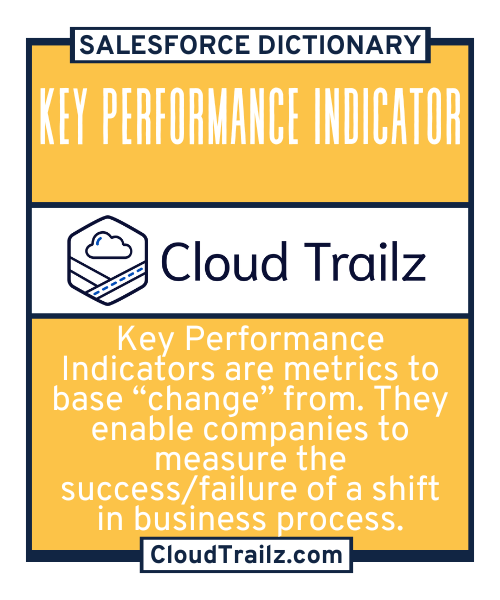
Key Performance Indicator (KPI)
Overview
A Key Performance Indicator, or KPI, is a quantifiable measure of performance over time for a specific objective.
Why KPI’s?
No matter how small or large the budget is, knowing if your system is having a positive impact on your employees and your customers is key to having a successful CRM. One of the easiest ways to do this is through KPI’s, which help show success or failure against objective metrics.
If the main goal you are trying to solve with a Salesforce Sales Cloud build is Opportunity Closure rates, and you build your system but don’t measure new Opportunity lifecycle timelines, how do you know if you have had success.
People wishing to implement Salesforce (or any system for that matter) or enhance an existing tool should define what success looks like. Working with your internal/external implementation team to then build against those defined outcomes will help reduce re-work and long term technical debt.
KPI’s shouldn’t just be created to have them, they should be impactful to growing and sustaining a healthy business and align with the roadmap of the company.
Tracking KPI’s
Reporting is far and above the most impactful way to track KPI’s. In Salesforce, reports and dashboards can be created for managers and leadership that highlight all of the metrics to track against your KPI’s.
This is why defining them ahead of time and aligning with your team completing the build is so crucial. It drives not only the configuration, but ensuring you have the correct suite of tools available to capture the metrics you need.
Common Challenges
#1 – Key Performance Indicators can’t be measured after implementation
Resolution
If using Key Performance Indicators to track success of project, ensure they are quickly measurable and attainable. A 5 yr revenue growth goal, can’t quickly be measured to tell whether or not a project was successful. If Sales, focus on Lead Lifecycle time and if it’s decreasing. If Service, track case closure rates to see what efficiencies have been gained.
#2 – Key Performance Indicators don’t align with Project Requirements
Resolution
Work with your business stakeholders to ensure the Key Performance Indicators you want to see changes against are measured in the requirements. If you’re focus is on shortening Lead conversion times, but the business spends more focus on enhancing Opportunity Pipeline management, there has been a misalignment.
Who is Impacted?
Admins
Knowing how to measure or define success is key to helping admins build solutions that impact KPI’s.
Leadership
Leadership can easily track achievement and failure in business plans or product roadmaps.